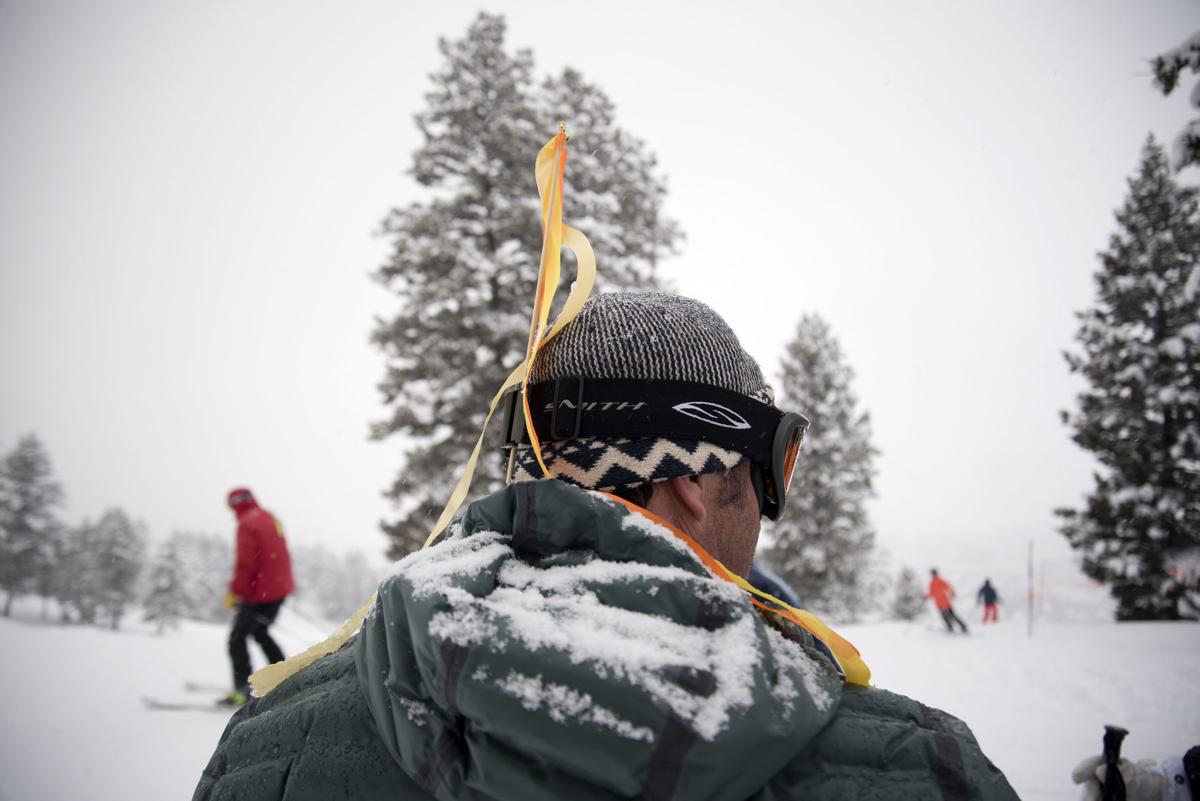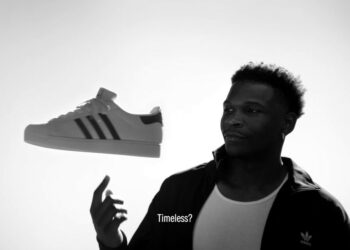
As the lights turned on at Snow King Mountain Resort on Saturday, an armada of young skiers loaded the Rafferty Lift.
Wooden wands adorned with ribbons poked out from goggle straps, coat pockets and mittened hands. The skiers unloaded at the midstation, splitting into two groups. The more advanced set took off down the lift line, the other along Slow Trail, a meandering cat track that crosses underneath Rafferty.
The kids waved their ribbons and followed a crew of coaches. Photographers spaced out along the run, snapping pictures of the skiers’ surprisingly straight lines. The two groups’ tracks intertwined as they skied down, and near the bottom of Rafferty they merged into a long snake that hooted and hollered all the way to the bottom of the lift.
The parade kicked off Coombs Fest, an annual celebration that capped a big week for the Doug Coombs Foundation, which helps low-income kids learn to ski. The week started with an inaugural fundraiser designed to help the foundation find solid financial footing as it undergoes explosive growth in its ski programs and expands its summer activities as well.
Both events revealed an organization that is forging a new path in the sometimes exclusive ski industry.
Built on a ski legend
Doug Coombs, the foundation’s namesake, was a pioneer of freeskiing. He built his reputation in ski films before turning his attention to guiding clients, first in steep skiing camps in Jackson, then in La Grave, France. He revolutionized the sport, pushing it to greater heights and levels of daring. And throughout it all he exuded a love of skiing.
In April 2006 Coombs died while trying to save his skiing partner, Chad VanderHam, who had fallen while skiing a couloir in La Grave. Coombs tumbled down the same cliffy slope as VanderHam as he contemplated the rescue, and both men died from their injuries. Death is a constant reality in the freeskiing community, but that makes it no easier for those left to cope with the losses.
After Coombs died his wife, Emily, took their son, David, back to Wyoming. They integrated back into Jackson, but she noticed that many of David’s classmates weren’t in the activities her son participated in outside of school.
“I volunteered when my son was in kindergarten through third grade,” she said. “There was lots of segregation. I became familiar with the kids and saw the Latinos weren’t playing soccer or other after-school sports. I wanted to change that.”
So when David was in third grade she started the Coombs Foundation to give low-income kids a chance to hit the slopes. That winter, the 2012-13 season, she enrolled seven children in Snow King’s ski school. The nascent foundation’s work quickly spread through the Latino community.
“Every weekend we’d have another family show up,” Emily Coombs said.
By the end of that first winter the foundation had 28 children skiing in lessons. Those kids are still with the program, serving as advocates, she said, giving her credibility with Jackson’s Latino population, which is often segregated from the rest of the community. Because of the positive results with the original cohort, growth came quickly.
For winter 2017-18 the foundation has 200 kids in its program. Participants are furnished with ski rentals, lessons and lift tickets free of charge, and they can participate from 4 years old until they graduate from middle school.
Though the foundation is not solely for the Latino community, Coombs said that by virtue of Jackson’s socioeconomic makeup, close to 95 percent of its skiers are Latino.
Skiing toward stability
The exponential growth means more skiers on the slopes, but it also signifies that the foundation has grown into something that Coombs cannot run on her own.
Thankfully, Jackson is a town rife with philanthropic people with a wealth of experience growing and running organizations. Bill Maloney, a board member, said the foundation has spent much of the past year building a sustainable operation. It has hired Mary Erickson as executive director, which “was desperately needed.” But it still had one big hurdle: funding those 200 kids.
“I looked at the [profit-and-loss statement] and said, ‘We’ve got a little problem. We’ve got to figure out a new model for funding the organization,’” Maloney said.
So he cooked up a new fundraiser, Skiing with the Stars, which debuted Feb. 27. It gave donors a chance to spend the afternoon touring Jackson Hole Mountain Resort with some Teton legends: Kit DesLauriers, Jess McMillan, Tommy Moe, “Sick” Rick Armstrong and Lynsey Dyer.
A successful day
McMillan, who, as an employee of the resort, knows the terrain pretty well, led a group of skiers all over the southern half of the mountain. She played the consummate guide, stopping often to regroup and checking in with her clients.
But on one run the former freeskier showed why she is a Jackson Hole star. With her group stopped at the top of the Cirque, a steep, open run near the Headwall, McMillan casually flipped the switch, hopping onto the bumpy slope and skiing it faster and with less effort than most people ski groomers. Her group members fawned over her smooth skiing before coasting down the same hill, albeit a bit slower.
After the day of ripping around the resort, donors, stars and kids from the foundation met to talk about the organization’s work. Maloney said the entire day went even better than expected, both logistically and financially.
“Everyone was in full support,” he said. “Caldera House comped us for the event, and the resort was on board. The best thing is, because everything was comped, almost every part of the donations go toward the bottom line.”
Sending almost 100 percent of the money raised into a foundation’s coffers is a fundraiser’s dream, and the organization hopes to make Skiing with the Stars an annual affair.
Maloney said the foundation sold an array of donated items in an online auction, including a heli-ski trip with Valdez Heli-Ski Guides, the company started by Doug Coombs in Alaska. But he wants to up the ante, maybe by adding trips from other heli-ski companies or increasing the number of donors that are able to rip with the local legends.
By building on the momentum of this year’s event, Maloney thinks that Skiing with the Stars can be an important step on the road to solvency.
“I think within a year we’ll have more people engaged because we now have the model,” he said. “And I would think by the end of 2019 we can look around and say we are on solid financial footing.”
New friends on powder days
But all the hobnobbing with stars plays second fiddle to developing the next generation of skiers. And the dedication Coombs puts into crafting kids skiing programs was on full display Saturday night at Coombs Fest.
Coombs Foundation skiers covered the runs accessed by the Rafferty lift. They plowed through soft snow on the sides of the runs and meandered across the groomers, which the heavily falling snow had blanketed. Just before 5 p.m. a loudspeaker summoned the skiers, any of their parents who skied and a cadre of Snow King employees for the ribbon parade.
Even those still focusing on making parallel turns were excited to display their skills. The families that gathered were part of the skiing community, and their children were just like any other elementary-school-age skiers, pumped about small airs, powder turns and racing their friends.
That inclusivity is Coombs’ goal.
“I wanted them to feel welcome here,” she said. “A community should be made up of all kinds of people.”
The segregation in Jackson between the Latino and white populations is not unique. Many ski communities display the same divide between the group of people who do many of the jobs to make resort towns run and those who are the main economic drivers of the ski industry.
Brian Krill, executive director of the Jackson Hole Ski and Snowboard Club, said the ski industry will have to face that reality soon. Meaning the Coombs Foundation’s work could not come at a better time.
“If it gets more and more expensive and fewer people from different parts of the population can do it, it’s really a dying sport in a lot of ways,” Krill said. “The people that will be skiing in five to 10 years do not look like us.”
Recognizing the important mission of the Coombs Foundation, the Ski Club has offered $20,000 in scholarships for Coombs Foundation skiers each of the last two seasons. Kids who put in one year in the foundation’s learn-to-ski programs can apply for the Ski Club’s scholarships for two seasons. Krill hopes that’s enough that they “catch the bug and want to stay part of the club.”
The first year the organizations teamed up, 11 skiers jumped up to the club. In a mirror of the overall growth of Coombs’ organization, this year the Ski Club has 28 skiers who started in the Coombs Foundation.
Krill said that the club’s job is to ensure that once a kid grows to love skiing, he or she can take that drive as far as it can go, whether that’s a competitive ski racing career or simply having the skills to ski more consequential terrain.
A chance to be like Breezy
Talking to the crowd that assembled for the festivities after the ribbon parade, Krill said, “We just had two competitors in the Olympics. Breezy [Johnson] and Resi [Stiegler] are Jackson Hole kids, and all these kids are Jackson Hole kids, too. Our job is that those kids can have the opportunity that Breezy or Resi do.”
While not every kid will want to try for the Olympics, Coombs wants to give all of her kids, and their families, outdoor pursuits that make their lives more fulfilling. That’s why she has expanded the foundation’s offerings to include rock climbing, hiking and soccer, so that they have year-round activities.
“Just because the skiing ends doesn’t mean there nothing else to do,” Coombs said. “It keeps them active.”
Through the exercise, the skiing, the bringing families into the community, the same emotional undercurrent that punctuated Doug Coombs’ skiing career imbues everything Emily Coombs has done with her foundation.
“We just want their kids to have joy and happiness,” she said.
One speech at the end of Coombs Fest brought that point home. Deyna Lira, a 13-year-old skier whose entire family has turned to skiing, stepped to the microphone to tell her story of skiing with the Coombs Foundation.
“I’m proud of being here and giving thanks to Emily Coombs, my favorite person,” Deyna said. “My life has changed ever since I started skiing, I’ve been skiing for five years, and I’ve learned a lot of things during this experience.”
The crowd clapped and cheered as Deyna told about the friends she’d made in her transformation into skiing. But the biggest applause was saved for one of her last lines, a lesson learned in her years of skiing.
“One of my friends said, ‘You can’t buy happiness, but you can buy a lift ticket that will bring you happiness.’”
Source:-.jhnewsandguide







